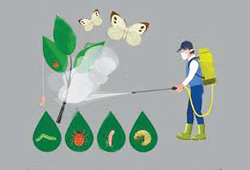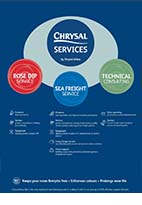 If it is possible to learn from the mistakes of others, a moment has come for our parliamentary committees and the Ministry of Agriculture to take a good look at Sri Lanka. For, what better way to implement great policies than by seeing their impact beforehand?
If it is possible to learn from the mistakes of others, a moment has come for our parliamentary committees and the Ministry of Agriculture to take a good look at Sri Lanka. For, what better way to implement great policies than by seeing their impact beforehand?
And, as the Kenyan establishment continues to flirt with the idea of banning most of the country’s pesticides, it now has a full example of a country that did it. For, in April last year, Sri Lanka became the world’s first organic-only nation, by banning all agrochemicals.
So no one needs to argue anymore about what it does to agriculture stopping the medicines, the dips, the weed control, or the insecticides. Now, we can see it, as Sri Lanka handles a consequent and colossal food crisis. This is particularly important, as it clearly cuts no ice pointing out the obvious outcomes of slashing our agricultural production by an estimated 40%.
For with organic versus conventional agriculture, it seems no one cares that without pest control mosquitoes spread malaria, termites eat buildings, Fall Armyworm and locusts eat crops, aphids spread viruses that kill plants, and weeds choke 50% of yields.
It matters not that keeping one hectare of land weed-free by hand takes an estimated 126 hours a year. It doesn’t matter that rigorous studies across the entire globe have never found any organic model that can produce as much food as conventional farming.
In the US, Department of Agriculture data shows that organic farms produce 67 percent of the yield of conventional farms. Worse, German organisations have been funding the anti-pesticide campaign in Kenya, yet organic farmers in Germany harvested an average of 48 percent of the produce their conventional peers did, from 2012 to 2019.
So, is that our best future, to cut our yields to 48 percent? Putting Kenya on that path will deliver food not here for eating, extra imports needed pushing down the value of the shilling and making every import more expensive and smallholder incomes lost, destroying school fees and personal consumption across 70 % of the population, thereby firmly ensuring it affects everyone else too.

See what pesticide ban did to Sri Lanka,which is exactly what is now playing out in Sri Lanka. Indeed, by last month, the New York Times headline was “Sri Lanka’s Plunge into Organic Farming Brings Disaster”.
Yet, still, we have no impact analysis on banning pesticides which have, additionally, never been proven harmful: and I say that fully aware of the foreign-funded slogans saying they are killing people. The missing pieces are only scientific evidence and an information regime that penalises NGOs for publishing completely baseless claims.
Do we really want to get into the same kind of learning as that, to go ahead regardless, and to pay the price over and over? Or could we study what it is about organic farming that means it produces so much less, and weigh up genuine science-based health risks, versus the health risk of starvation and newly extreme poverty?
Interestingly, as the use of chemicals is being lauded to have helped in the containment of desert locusts, Tuta Absoluta, etc in many counties, Gladys Shollei, the Uasin Gishu County Women Rep, has petitioned the National.
Assembly, seeking a total ban on agrochemicals that have been banned in the European Union (EU).
In the petition, the lawmaker argues that the volume of imported pesticides, herbicides and fungicides have more than doubled in four years, posing a risk to health and the environment.
Sources from the Kenya Plant Health Inspectorate Service (Kephis) and Route to Food Initiative confirmed that the volume of imported insecticides, herbicides and fungicides has more than doubled from 6,400 tonnes in 2015 to 15,600 tonnes in 2018.
Intensive agricultural production And, the demand for pesticides has grown because of increased, more intensive agricultural production and the emergence of new pests and diseases.
“The world is struggling to feed the growing population and here we are pushing for the ban on agrochemicals which are technologies being used to prevent pests and diseases. If we withdraw all the products, you will not manage to produce food crops and control pests among them desert locusts,” Eric Kimunguyi, CEO Agrichemicals Association of Kenya says.
“The issue of whether to withdraw pesticides use is eliciting varied reactions but will have a very negative impact on the economy. If we banned those products, Kenya will not afford to feed the population.”
According to him, organic food production alone cannot feed the world. Kimunguyi says it takes 9-15 years for one to have a pesticide product, therefore is not something one wakes up and declares a ban on without scientific backing.

Dr Esther Kimani, the CEO Pests Control Products Board (PCPB), says Kenya cannot do without pesticides. “We are in the tropical climate where pests are in plenty and they can damage crops to a point where you can’t harvest anything,” she explains.
Dr Kimani says when there was outbreak of locusts, it is the chemicals that managed to contain them. She explains that as much as others would want to use biological control products in the management, their mode of control is slow.
Dr Kimani says pesticides will never get out of the market, adding that even European Union farmers still use pesticides. She says: “When the issue of banning pesticides products came up, we informed the industry that we want to start risk assessment processes, because, whatever decisions we make need scientific backing.”
As the pesticides board, she says before any pesticides are registered in Kenya they do a lot of evaluation, including their harm to humans, animals and environment. “That way, we recommend how it should be handled and the information is normally on the label of the pesticides,” she shares.
But what do the farmers say? Onesmus Malinda, says he cannot do without agrochemicals. Malinda, who lives along Kangundo Road,Nairobi, says for many years he has planted tomatoes, they are always attacked by among other diseases, Tuta Absoluta.
“Every time l plant tomatoes, l have to buy pesticides to help control diseases and pests in my farm. Without these chemicals, l will not harvest anything,” he says.
Safe use of pesticides
Dr Kimani says one of the challenges is that farmers don’t read instructions when they use pesticides, despite labels clearly stating and guiding how one is supposed to handle them.

And, in case of poisoning what one is required to do. Her advice is, if a farmer gets pesticides that are not labelled, or the label is not legible, they should report. She says the government is collaborating with the industry and others to create awareness on safe use of pesticides.
Dr Kimani says dealing with porous borders is tricky because some agrochemicals that are sneaked into the country can be poisonous or are counterfeits.
“What we do is create awareness amongst farmers at the border. We also collaborate a lot with border management committee consisting of different organisations such as Kephis, public health, customs that can report such cases,” she explains.
Ian Shaw, the Managing Director KAPI Ltd, agrees that pesticides have a role in food production. However, the issue is the type of pesticides and level of harm to human and environment that can be permitted. Shaw explains each pesticide is different - some are extremely harmful, others medium and others low level. The focus is to remove the harmful ones and not all.
“There are thousands of pesticides using hundreds of Active Ingredients. If the most harmful Active Ingredients were to be banned, say 5-10 per cent there would still be adequate choice for farmers in terms of alternative pesticides to control pests,” said Shaw.
An independent study by Egerton-based Tegemeo Institute of Agricultural Policy and Development shows farmers will suffer losses of crops with the ban on the proposed agrochemicals.

“The ban on agrichemicals would reduce crop production, increasing reliance on import. Further, an increase in post-harvest losses are expected due to potential ban, with adverse effects on poor households,” says Dr Timothy Njagi, a researcher at the institute.
Dr Njagi advises that instead of a ban, the country needs to consider other options for the safe use of agrochemicals. Kimunguyi says Kenya or even Africa is using five per cent of the total pesticides manufactured across the world.


